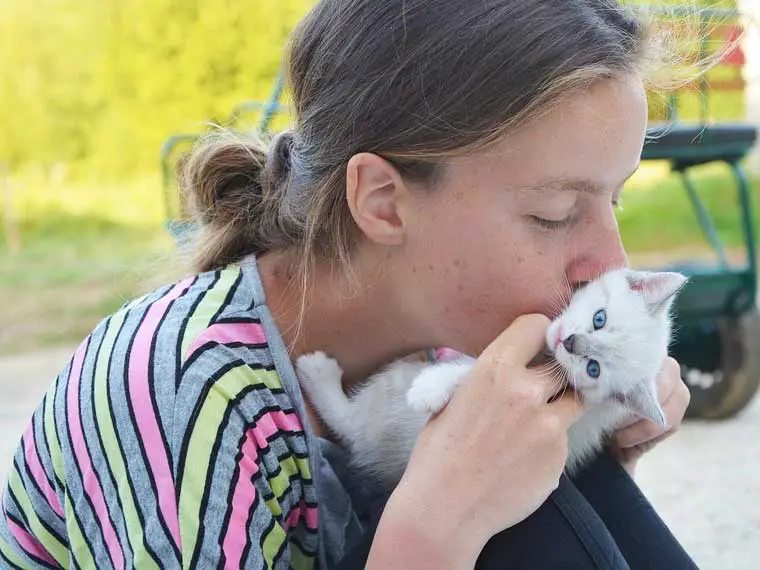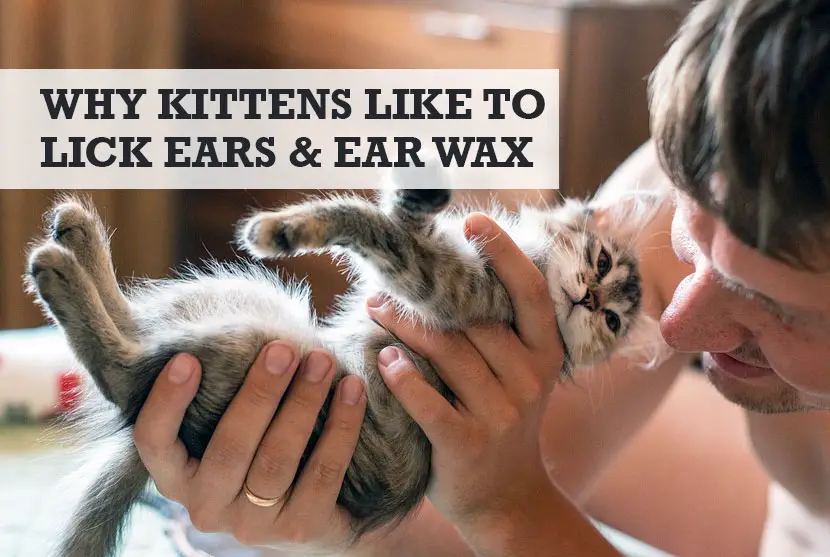Kittens have some very funny habits. Some you might like, some you might not. One habit which diversifies opinion is when kittens try to lick your ear (and even the ear wax)! It might be too ticklish, or you might find it disgusting!
Regardless, there are good reasons why kittens lick your ears and earlobes. Here’s the reasoning and science behind it.
Why does my kitten lick my ear? Kittens lick your ears because they like the taste of salty sweat and the scent of proteins in ear wax. Kittens will also go for your ears as they develop affection, play, grooming, and hunting behaviors.
Why kittens lick ears, earlobes, and ear wax
As you can see from my short answer above, there are a few different reasons why a kitten will lick your ears at night – which is a weird way to be woken up! Below I’ve gone into more detail; you should find the reasons for kittens liking to lick ear wax particularly interesting!
1. Ear licking is affectionate behaviour
If your kitten is licking your ear, it might not necessarily be because they want something. As kittens grow into adult cats you will notice that they lick each other on the face as a form of affection.

This means that as human owners, we become part of the pack and we then get our ears licked by kittens. If your kitten isn’t acting aggressively in any way when they’re doing this, then enjoy the love – if you can handle the ticklish nature!
2. Your ears are tasty when licked
Another reason why your kitten licks your ears at night is because they like the taste. Some cats lick and bite ears because it’s taste good – that salty flavor can be appealing. A quick warning though; it could be a sodium deficiency or something lacking in the kitten’s diet.
Sodium deficiency can happen slowly over time or it can have a rapid onset. If sodium levels drop quickly, the brain can go into shock. This can cause many neurological problems and can be fatal if not promptly corrected. If sodium levels drop slowly over time, the body adjusts to protect the brain from the change. This deficiency still needs to be treated, but is not a medical emergency.
Wag Walking, https://wagwalking.com/cat/condition/sodium-deficiency
So, if you are a sweaty sleeper, or perhaps you’ve just had a session on the treadmill and find your kitten can’t help like your ear, it could be the sweaty taste he likes!
Why does my kitten lick my ear wax?
The reason why your kitten licks your ear wax is very different.
Kittens and even adult cats like to lick human ear wax because the gunk contains smelly things like dead skin cells, fatty acids, and small amounts of cholesterol. Whilst those might not sound appealing to you, kittens like ear wax like this as it’s a scent high in protein.
Their brain will tell them that the ear wax smell is the route to some tasty animal protein. You can imagine their disappointment when it turns out your ear wax isn’t quite the feast they imagined it was going to be!
3. Ear licking is grooming behaviour
Kittens also like to lick ears as part of their development concerning grooming. Cats are very clean creatures who like to groom themselves and each other. When a cat licks their ear, it removes any dirt or debris that might have gotten stuck in there.
You will notice that kittens often lick themselves after playing outside or rolling around on the ground.
Statistics show that cats tend to lick each other’s ears regularly for affection as well as their human owner’s nose and faces.
This type of licking is similar to a cat-to-cat behaviour known as allogrooming, which is basically mutual grooming. A cat will learn this from its mother when they’re a very young blind and deaf kitten. It’s basically to clean the kitten and strengthen social bonds.
Dr David Sands, https://www.sciencefocus.com/nature/why-do-cats-lick-people/
4. Ear licking is teething behavior
Like human children, kittens use their mouths to explore the world around them. Part of this development includes teething. As a teething kitten matures, its licking and biting will come into play.
Kittens will bite and lick to alleviate the pain in their teeth.
If you are not enjoying your kitten biting and licking at your ears, an excellent way to prevent this behavior is to provide your kitten with small toys specially made for cats (here’s a good one on Amazon).
You might find your ears being licked getting annoying, but it’s important not to yell at them or get too aggressive.
This will cause the kitten to become fearful of humans and increase their likelihood of biting in future interactions.
5. Ear licking is social behaviour
If your kitten is licking and going for your ears, it might also be because they want to spend time with you. When a cat licks their human companion, they try to show the same affection as another cat in social situations.
This can be seen as an extension of their grooming behaviour and is often performed when owners are petting them or holding them on their lap.
If your kitten isn’t doing this too much during playtime but seems interested whenever you’re around, then consider yourself lucky. They could easily use those claws instead if they weren’t feeling so relaxed.
6. Ear licking is hunting behaviour (development with play)
Another reason why your kitten may be licking you is that they want to groom their next prey. Kittens spend most of their time playing and having fun, but it isn’t uncommon for them to revert into the hunting mode that all cats are born with – even if just for a minute or two.

Being licked by another animal means that they’re safe, so this behavior tends not to result in any negative consequences (although you might feel slightly violated).
If your kitten doesn’t play around like this too often, consider yourself lucky, as some kittens enjoy doing more than others. All young animals need an outlet to let off steam occasionally before returning to more normal behaviors.
7. Ear licking is trusting behaviour
Another reason for kittens licking human earlobes is that it helps develop trust between themselves and others who share similar living spaces (such as their owner). This can be seen as an extension of their grooming behaviour and often occurs when owners are petting them or holding them on their lap.
If your kitten isn’t doing this too much during playtime but seems interested whenever you’re around, then consider yourself lucky. They could easily use those claws instead if they weren’t feeling so relaxed.
If your kitten licks your ear, don’t be alarmed. It’s unlikely to mean any negative feelings between the two of you and could just be an expression of love. Cats only lick things when they feel safe.
Cats lick ears because it helps develop trust between themselves and others who share similar living spaces (like humans). The behaviour is likely to happen between a mother and her kittens.
However, it’s also seen in adult cats who have close relationships with their owners. Kittens learn from a young age that licking the ears of others around them means they are safe – it’s not something you should discourage if your kitten seems interested in doing it around you whenever they want.
If anything changes, though, such as his usual routines where he doesn’t want to play anymore, then make sure to take note.
Should I let my cat lick my ears?
If your cat is licking your ear, then don’t be alarmed. It’s unlikely to mean any negative feelings between the two of you and could be an expression of love.
Cats mainly lick things when they feel safe so if yours does this regularly whenever you’re close by – regardless of whether his behaviour has been good or bad – then consider yourself lucky.
Don’t scold them too much. They won’t understand why you’re telling them off and might even hold a grudge against you for a few hours!
If anything changes in their usual routines (such as not wanting to play with toys anymore), then make sure to take note.
Research show that kittens tend to lick each other’s ears for affection and their human companions’ ears, faces, and hands.
Conclusion
Kittens are cute, furry little balls of joy that love to cuddle. They also tend to do some odd things, like licking your ear for no reason at all. It might seem odd, but there are several reasons why they do this as discussed above.
You might also like…
- When you should let your kitten start roaming the house
- How soon you can touch and handle newborn kittens
- Possible reasons why your kitten has started to vomit
Image in header via https://pixabay.com/photos/man-kitten-pet-cat-adorable-6604839/


